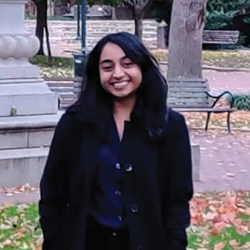
“Climate change is solvable,” says Samanvitha Danda (Master of Environmental Studies ’20). “Some people think it’s a lost cause and don’t want to do anything about it, hence we’re not making a lot of progress. But the minute people understand that every action counts, and there is so much we can do to solve this problem, we get more buy-in from different stakeholders and we can make a change.”
Samanvitha’s passion for climate action led her to study chemistry, environmental science, and zoology during her bachelor’s degree, and upon graduation she realized she wanted to delve deeper into the field of sustainability. She chose Penn’s Master of Environmental Studies (MES) to continue exploring her options. “What I really liked about this program was that it didn't have one set curriculum,” Samanvitha explains. “Most of the programs I looked at had modules that were compulsory for a one- or two-year degree. I wanted to be a little more flexible and look into several different areas.”

At Penn, Samanvitha could supplement her sustainability curriculum with courses that interested her from across the University. She decided to take a course focused on life cycle assessment after encountering the strategy in an introductory course; she also learned the programming languages R and Python in a data management course from the Master of Behavior and Decision Sciences program. Both electives informed her capstone study: “A sustainability assessment of the Solarize Philly program,” partly inspired by her summer internship at Philadelphia Energy Authority. “That is just what I was looking for. I was able to tailor my degree to exactly what I wanted,” Samanvitha reflects.
“The MES program really sets you up for success through all of the skills you can gain from being in the program, as well as all of the opportunities that you get working on projects, doing internships, and being able to connect with people,” adds Samanvitha. Even so, it was no small challenge to land a job in a competitive field when she graduated during a global pandemic, so she leveraged the resources available to her both during the program and after graduation. “One piece of advice—which was given to me by people who were one year ahead of me in the program—was to gain transferable skills,” she says. That’s one reason she took courses in geographic information systems (GIS) and data management and life cycle assessment; it’s also why she completed Leadership in Energy and Environmental Design (LEED) Certification and Global Reporting Initiative (GRI) Professional Certification during the program. Internship opportunities like Solarize Philly as well as Penn’s SAS Sustainability gave Samanvitha experience with different types of projects plus the soft skill of collaborating with a wide array of people including students, building managers, and academic experts. “Sustainability is an issue that the world is facing collectively,” says Samanvitha. “Solving any problem, from reducing carbon emissions to renewable energy to waste management, involves projects that require people with different skill sets—and you need to have the ability to speak their language, understand what they're saying, and work together towards a common goal.”
Networking is also extremely important for a job-seeking graduate, says Samanvitha. As a student, she joined campus groups such as Climate Leaders at Penn, and made the most of department reimbursement to attend sustainability conferences and learn from industry professionals. After graduating in May, Samanvitha chatted with MES alumni about their experiences applying for jobs, what kinds of opportunities they’d heard of and where they might be posted, and which organizations were doing the kind of work that interested her. It was through these conversations that Samanvitha became familiar with the sustainability consulting firm EcoAct, and sought out employment opportunities on their website. She accepted a position as an analyst at EcoAct just a few months after graduation.
EcoAct is an international consulting firm that helps businesses and organizations with their climate strategies and other sustainability goals—similar to the energy-focused analysis Samanvitha had been doing in her capstone and life cycle assessment projects. “Energy plays an important role in almost everything we do in our lives. It affects every single activity,” she explains. As an analyst, Samanvitha supports the organization’s consultants on several projects, drawing on her tailored curriculum to do greenhouse gas emission calculations and life cycle assessments. Likewise, her courses in sustainability and supply chain management prepared her to work in corporate sustainability. “I understand the language,” she says. “I understand the technical terms and different reporting frameworks and everything I need to jump into it.”
With more experience at the consulting firm, Samanvitha sees herself drawing on her collaborative skills to work as a sustainability consultant herself—someday. “At the moment, this is exactly the type of job that I want to be doing,” she says.





